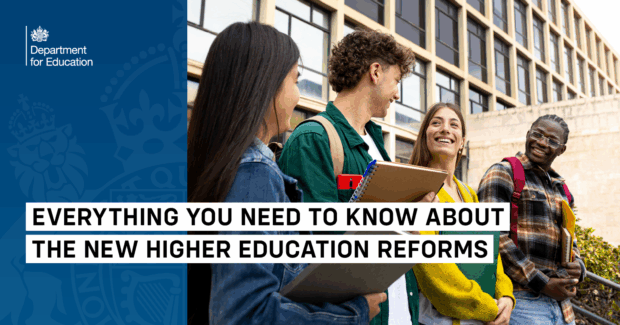
The government has announced major changes to higher education as part of the Post-16 Education and Skills White Paper, designed to make university more accessible, fairer, and better value for students.
Here’s what you need to know about how these reforms could affect you.
How will university become more accessible?
Going to university is a big decision, and cost can be one of the biggest worries for students and families.
To give students more certainty about their finances, maintenance loans will increase each year in line with forecast inflation. That means the money you receive will go up as prices rise.
Students from the lowest-income households will see the biggest increases in cash support, helping to ensure that everyone can afford to focus on their studies.
The government is also bringing back targeted maintenance grants, that do not have to be repaid, to give extra help to those who need it most. These grants will be funded through a new charge on international student fees, ensuring additional support without extra cost to domestic students.
What’s happening to tuition fees?
To help stabilise university finances, tuition fee caps will rise with forecast inflation, ensuring that universities can continue to deliver high-quality courses.
In future, only universities that achieve quality ratings, demonstrating strong outcomes and positive experiences for their students, will be allowed to charge the maximum fee.
This means universities will need to show that they’re offering real value for students and the taxpayer.
How will standards in higher education improve?
Students deserve to know that their time and money are being well spent.
The Office for Students (OfS) will have new powers to make sure universities maintain high standards and deliver good student outcomes and satisfaction rates.
If courses don’t deliver for students, the OfS will be able to act quickly to hold providers to account.
The government will also take action against abuse of the system by recruitment agents.
How will learning become more flexible?
Education doesn’t stop at 18 or 21. The new Lifelong Learning Entitlement (LLE) will make it easier for people to learn, retrain or upskill at any stage of life.
Learners will be able to move between universities, colleges and training providers, building up qualifications over time rather than needing to complete a full degree in one go.
The government is also looking at ways to introduce “break points” within degrees, allowing students to gain recognised qualifications as they progress — and return later to complete their studies if they choose.
What do these changes mean for students?
These reforms are about creating a fairer, more flexible and higher-quality higher education system that delivers real value for students.
By increasing financial support, strengthening standards, improving housing and introducing new opportunities to learn throughout life, the government aims to ensure that no student is priced out of higher education.